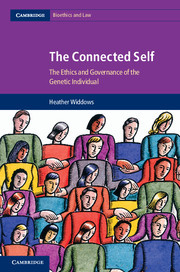Description
The Connected Self
The Ethics and Governance of the Genetic Individual
Cambridge Bioethics and Law Series
Author: Widdows Heather
Heather Widdows suggests new ethical frameworks for genetic governance, to replace those that offer little protection and permit significant injustice.
Language: English
Subject for The Connected Self:
Approximative price 104.26 €
In Print (Delivery period: 14 days).
Add to cart
Publication date: 01-2013
216 p. · 15.6x23.5 cm · Hardback
216 p. · 15.6x23.5 cm · Hardback
Description
/li>Contents
/li>Biography
/li>
Currently, the ethics infrastructure ? from medical and scientific training to the scrutiny of ethics committees ? focuses on trying to reform informed consent to do a job which it is simply not capable of doing. Consent, or choice, is not an effective ethical tool in public ethics and is particularly problematic in the governance of genetics. Heather Widdows suggests using alternative and additional ethical tools and argues that if individuals are to flourish it is necessary to recognise and respect communal and public goods as well as individual goods. To do this she suggests a two-step process ? the 'ethical toolbox'. First the harms and goods of the particular situation are assessed and then appropriate practices are put in place to protect goods and prevent harms. This debate speaks to core concerns of contemporary public ethics and suggests a means to identify and prioritise public and common goods.
1. The individual self and its critics; 2. The individualist assumptions of bioethical frameworks; 3. The genetic self is the connected self; 4. The failures of individual ethics in the genetic era; 5. The communal turn; 6. Developing alternatives: benefit sharing; 7. Developing alternatives: trust; 8. The ethical toolbox part one: recognising goods and harms; 9. The ethical toolbox part two: applying appropriate practices; 10. Possible futures.
Heather Widdows is a Professor in the philosophy department at the University of Birmingham, where she teaches moral philosophy, bioethics, global ethics and health and happiness.
© 2024 LAVOISIER S.A.S.

